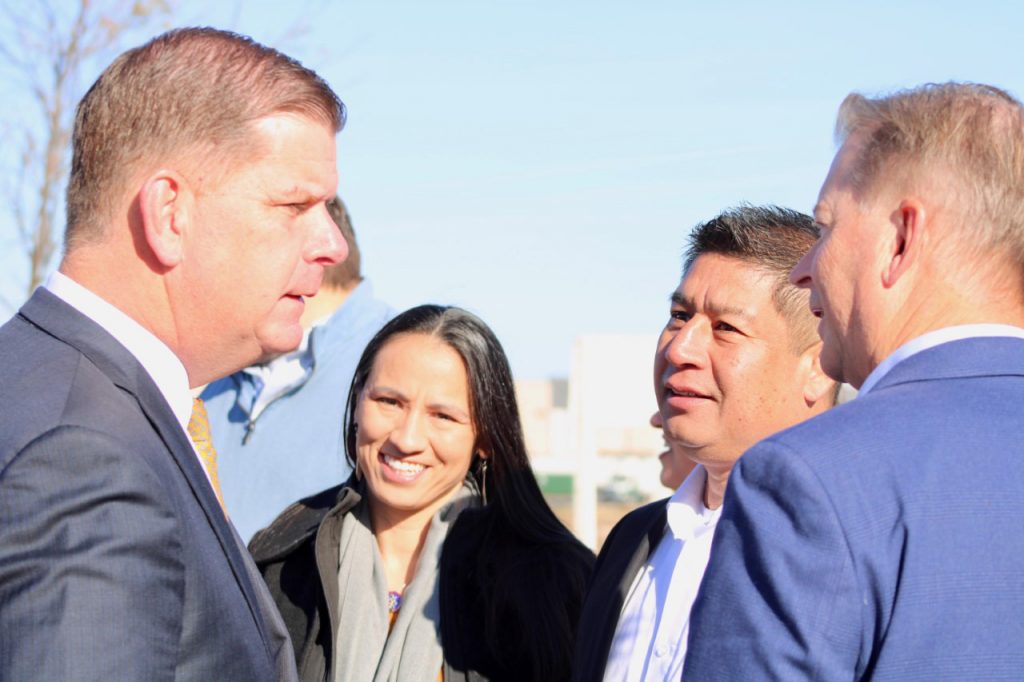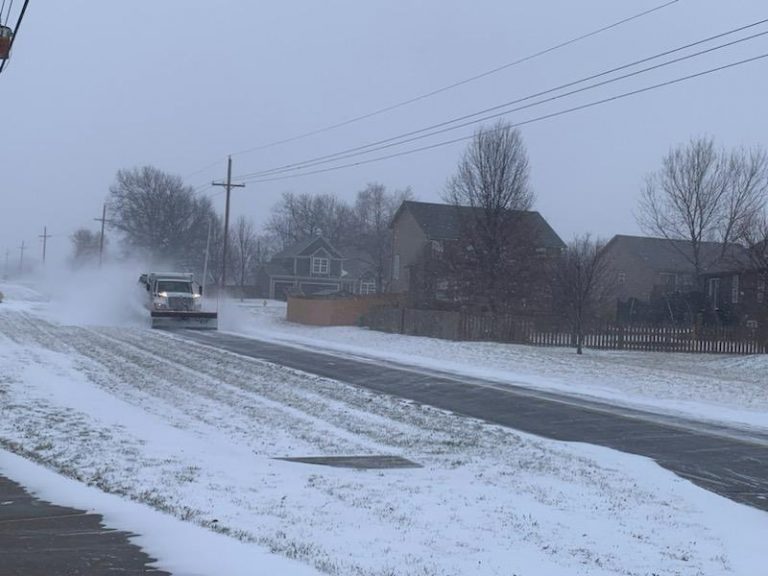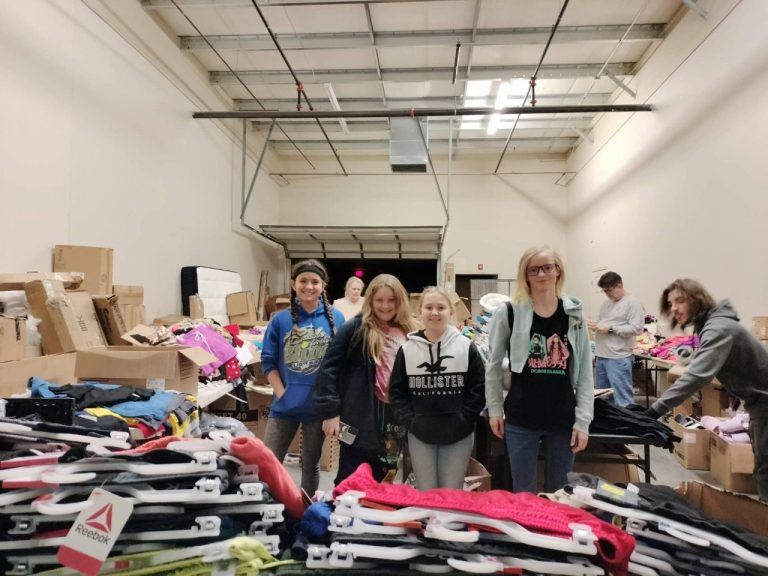Better opportunities for American workers, keys to boosting the nation

Cherryroad Media Creating better opportunities for American workers and providing resources for their success are keys to boosting the nation’s supply chain and building a stronger country, U.S. Department of Labor Secretary Marty Walsh said Wednesday in Edgerton.
Walsh joined 3rd Congressional District Rep. Sharice Davids, (D-Kansas), during a visit to Johnson County Community College’s Commercial Driver’s License training program. The two toured the driver training space at the Learning and Career Center at Logistics Park in Edgerton and visited privately with students and instructors before meeting with the media to discuss how workforce shortages, including those in the trucking industry, have resulted in increasing costs for families.
With a record-low number of commercial truck drivers available across the United States, Walsh said the Department of Labor continues to invest in workforce training, partnerships and programs like JCCC’s to put drivers back on the road. So far, he said, the number of truck driver apprenticeship programs across the country has doubled.
“We need to make sure we are putting pathways in place where people get a chance for workforce development programs where there’s a job at the end of it,” he said. “Just like you’re seeing right here… There are lots of people working in America today for minimum wage that are able to do good jobs. They just don’t know the pathway in there. We need to continue to work with workforce programs and community colleges all across the country to make that happen.”
“Families in America are struggling, and we need to bring these prices down. All this work we’re doing, whether it’s in Washington or Kansas or Massachusetts or wherever it is, it’s about local partnerships. Local people knowing what local people need and local employers need. “ The pandemic, Davids said, only exacerbated the national truck-driver shortage issue, drastically affecting the nation’s supply chain.
“We’re seeing higher prices,” she said. “I know folks here at home have felt it at the grocery store, at the gas pump, at the pharmacy. The best way to combat that is investing in our workforce by making sure that truck drivers and programs like this are absolutely the way we address our supply chain issues – get them back up and running to lower costs across the board to transport the goods that all of us depend on.”
Davids said she has supported major bipartisan legislation which will boost domestic manufacturing and lead to the creation of new, good-paying manufacturing jobs nationwide.
“Those jobs are absolutely going to impact and require the services of the trucking industry because the goods we’re making here at home need to be transported,” she said.
“When we talk supply chains, we know our infrastructure investments are absolutely necessary, and that’s why I was so happy we were able to get the Bipartisan Infrastructure Bill across the finish line because, in addition to the manufacturing jobs we’re going to see, we’re going to see good-paying construction jobs…I’m doing all I can to support Kansans here at home in these programs, who are running these programs, and I’ve made no secret about it. I think we have one of the most important regions and districts in the country when it comes to logistics, when it comes to infrastructure. We get the goods where they need to go. We feed the world, and it means we have to invest in our workforce.”
While supply chain issues and shortages have caused prices to rise, one of the biggest reasons for inflation, Walsh said, is the result of few American- made products and dependence on those made overseas.
“During the pandemic, we were so reliant on foreign imports that were stuck in the ocean or in factories that were shut down in parts of the world that it backed our supply chain up,” he said. “(The CHIPS Bill) is helping bring manufacturing jobs back to the United States of America and allows us to beat China in the microchip industry – an industry we created here in the United States of America. It’s also going to bring more supply chains back home and lower prices for cars and computers.”
Recently passed federal legislation, including the American Rescue Plan, the Bipartisan Infrastructure Bill and the CHIPS and Science Act, have all helped the country as it continues recovering from Covid, Walsh said.
“Some people in American manufacturing said we would never recover from global competition or the pandemic, but now we have the right policies and procedures in place,” he said. “We’ve created over 700,000 manufacturing jobs since President Biden’s taken office, and we’re just getting started. The Inflation Reduction Act that ufacturing jobs since President Biden’s taken office, and we’re just getting started. The Inflation Reduction Act that was just passed a few weeks ago, is now lowering prices in health care and energy. It’s going to cut the deficit. It’s the key to beating global inflation. It’s going to help us create more jobs, more good jobs. Since this administration has taken office and the congresswoman has been in office, 10 million jobs have been added to the economy.”
“This isn’t an exaggeration. When we look back at this moment of time in history, we’re going to look back at this time in Congress, and we’re going to understand that your congresswoman played such an important role in major legislation to get America’s economy back in line, to rebuild our roads and bridges and our infrastructure, to lower our prices for healthcare and prescription drugs and seniors and to also bring American manufacturing back to the United States in a big way.”
The nationwide unemployment rate is 3.5 percent. In Kansas, it is 2.5 percent, Walsh said. In September, the Bureau of Labor Statistics noted a trend in manufacturing jobs up 22,000 jobs that month alone. On average, the manufacturing sector has added 36,000 jobs each month in 2022. Construction jobs were also up 19,000 last month.
“I’m not seeing a cooling of the job market,” he said. “We’re still averaging 400,000 jobs added this year. My job, I’m focused on creating better opportunities and more opportunities, and that’s what we’re going to try and do. Obviously, we’re in a unique time right now with inflation, and this is unlike any other time. I’m not an economist, but we can’t compare this – what we’re going through right now – compared to a recession in the past, so I think we’re going to continue to

